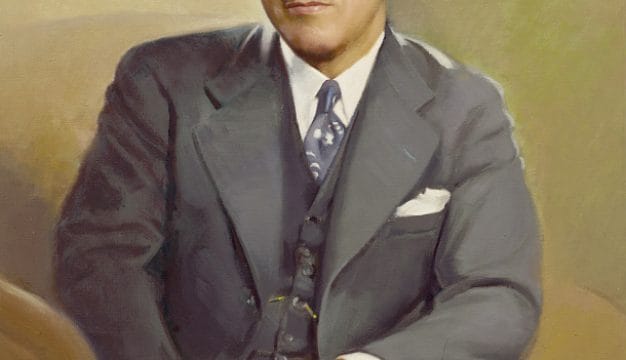Tuskegee Syphilis Study
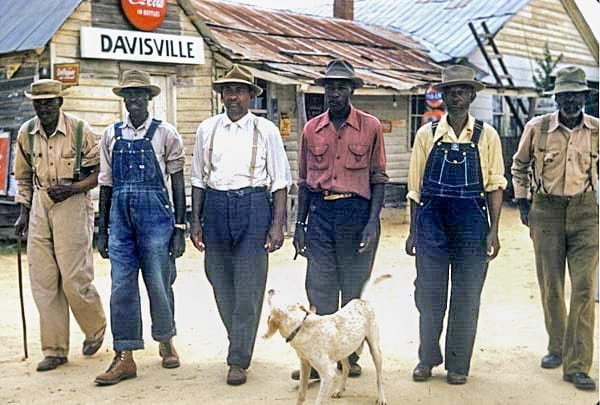 Tuskegee Syphilis Victims
From 1932 to 1972, the U.S. government sponsored the nation’s longest-running public health experiment in and around Tuskegee, Macon County. Under financial constraints imposed by the Great Depression, the U.S. Public Health Service (PHS) discontinued a successful program to document and treat syphilis in rural African American populations and replaced it with a study of the effects of untreated, late-stage, latent syphilis in African American men. The study was conducted with the cooperation of Tuskegee Institute and the public health departments of Macon County and the state of Alabama but without the consent of the participants, who thought they were being treated. It ended only after a media exposé prompted a national outcry. Controversy stemming from the experiment, now known as the Tuskegee Syphilis Study, prompted major reforms in medical research and a formal apology to the program’s unwitting participants by President Bill Clinton in 1997 as well as the establishment of the National Center for Bioethics in Research and Healthcare at Tuskegee University.
Tuskegee Syphilis Victims
From 1932 to 1972, the U.S. government sponsored the nation’s longest-running public health experiment in and around Tuskegee, Macon County. Under financial constraints imposed by the Great Depression, the U.S. Public Health Service (PHS) discontinued a successful program to document and treat syphilis in rural African American populations and replaced it with a study of the effects of untreated, late-stage, latent syphilis in African American men. The study was conducted with the cooperation of Tuskegee Institute and the public health departments of Macon County and the state of Alabama but without the consent of the participants, who thought they were being treated. It ended only after a media exposé prompted a national outcry. Controversy stemming from the experiment, now known as the Tuskegee Syphilis Study, prompted major reforms in medical research and a formal apology to the program’s unwitting participants by President Bill Clinton in 1997 as well as the establishment of the National Center for Bioethics in Research and Healthcare at Tuskegee University.
Syphilis is a venereal disease caused by a microscopic spirochete (a type of bacteria) that is transmitted through sexual contact or from mothers to children at birth. It is most infectious in its early stage, when sores, called chancres, appear. In the second stage, infected individuals often experience painful rashes, sores, and swellings. Left untreated, the disease goes into a third, generally non-infectious latent stage. Syphilis does not go away, but it can stay dormant for years or even decades. It can cause complications that affect major organs, such as the heart or brain, in about two-thirds of all cases. Debility, insanity, and death are often, but not always, the consequences.
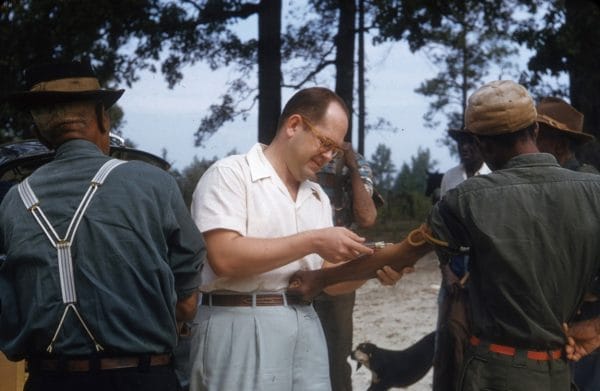 David Albritton
When the Tuskegee study began, syphilis sufferers usually were treated with a combination of heavy metals: neo-arsephenamine, bismuth, and mercury in individualized regimens that often lasted more than a year. Studies conducted in urban clinics and research performed by the PHS appeared to suggest differences in both the nature and extent of the disease among whites and among African Americans, although there was no biological basis for the differences. Many physicians assumed, inaccurately, that whites with syphilis were more likely to suffer from neurological symptoms and that blacks were more likely to suffer from cardiovascular complications, a conclusion based partly on faulty understandings of the disease process. Widely held assumptions regarding biological differences between blacks and whites also influenced the thinking of researchers during the Jim Crow era.
David Albritton
When the Tuskegee study began, syphilis sufferers usually were treated with a combination of heavy metals: neo-arsephenamine, bismuth, and mercury in individualized regimens that often lasted more than a year. Studies conducted in urban clinics and research performed by the PHS appeared to suggest differences in both the nature and extent of the disease among whites and among African Americans, although there was no biological basis for the differences. Many physicians assumed, inaccurately, that whites with syphilis were more likely to suffer from neurological symptoms and that blacks were more likely to suffer from cardiovascular complications, a conclusion based partly on faulty understandings of the disease process. Widely held assumptions regarding biological differences between blacks and whites also influenced the thinking of researchers during the Jim Crow era.
Public Health Service Conducts Syphilis Survey
In 1929, with funding from the philanthropic Rosenwald Fund, the PHS began a project in six southern counties, including Macon County in Alabama, to survey and treat black men and women with syphilis. Using the somewhat inaccurate blood tests of the day, researchers in Macon County found a 39.8-percent infection rate among the 3,684 black men and women tested. Through a combination of philanthropic and public funds, nearly 1,400 of those people began treatment for their disease. Pleased by the results, the PHS now had both a model for studies of the prevalence of disease and a way to develop a rural treatment program.
These studies raised another question. The country’s leading syphilis experts were puzzled as to why some patients did well with little or no treatment in the second and third stages, while others did not. PHS officials expressed concerns about this phenomenon to public health officials in Alabama, Macon County, and Tuskegee Institute and outlined a short-term program of minimal treatment for a select group of black men who were assumed to be in the third, or dormant, stage. PHS officials anticipated that the findings might indicate that treatment at certain stages of syphilis was unnecessary. They began another smaller program on latent syphilis in Tuskegee that focused only on men. As the Great Depression deepened in the early 1930s, however, the PHS and the Rosenwald Fund became increasingly unable to continue funding. PHS officers saw in this turn of events an opportunity for what is called a “study in nature” of untreated syphilis. That is, they assumed in this case that it would be “natural” for poor African Americans not to be treated.
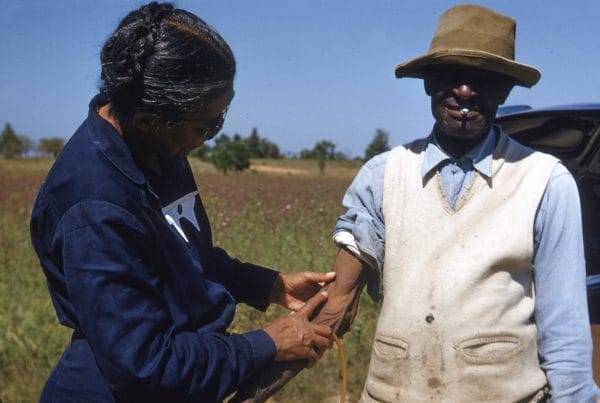 Eunice Rivers
The PHS selected only male subjects because it was easier for them to give a history of the visible sores and out of concern that possibly pregnant women could pass the disease on to their children. With the help of a Tuskegee Institute nurse, Eunice Rivers, officials set about finding subjects and controls (those without the disease) in Macon and surrounding counties. Advertisement by word of mouth, in houses of worship, and through employers brought local men to Tuskegee Institute’s hospital and the county health department for examinations and blood tests. The study began, as had the Rosenwald program, with treatment. As the number of individuals showing up for treatment rose, however, costs began to skyrocket, putting the entire plan in jeopardy. In response, PHS physicians Taliferro Clark, Raymond Vonderlehr, and O. C. Wenger decided to shift their focus to a study of untreated syphilis, modeled on a retrospective study of white men in Oslo, Norway, conducted on early syphilis at a time when mercury was the only treatment.
Eunice Rivers
The PHS selected only male subjects because it was easier for them to give a history of the visible sores and out of concern that possibly pregnant women could pass the disease on to their children. With the help of a Tuskegee Institute nurse, Eunice Rivers, officials set about finding subjects and controls (those without the disease) in Macon and surrounding counties. Advertisement by word of mouth, in houses of worship, and through employers brought local men to Tuskegee Institute’s hospital and the county health department for examinations and blood tests. The study began, as had the Rosenwald program, with treatment. As the number of individuals showing up for treatment rose, however, costs began to skyrocket, putting the entire plan in jeopardy. In response, PHS physicians Taliferro Clark, Raymond Vonderlehr, and O. C. Wenger decided to shift their focus to a study of untreated syphilis, modeled on a retrospective study of white men in Oslo, Norway, conducted on early syphilis at a time when mercury was the only treatment.
No Informed Consent
The PHS selected 399 black men with late-stage syphilis and 201 uninfected men to serve as controls. As was typical for medical studies at the time, there was no real informed consent. The men were led to believe that the rubs, tonics, and aspirins given them were treatments for their “bad blood,” the general term used in many communities for syphilis. Even the painful spinal taps were explained not as a diagnostic procedure (to check for neurological syphilis) but as a “back shot.” PHS physicians realized that the best scientific data would come from autopsies because doctors would be able to see directly how much damage the disease had done to the men’s bodies. They therefore authorized Rivers to offer $50 to participating families in exchange for autopsy agreements prior to burial. Local doctors were asked to withhold treatment from the men, although the extent of their compliance is uncertain. Rivers also provided food and clothing to the men and their families and referrals for medical care for other illnesses.
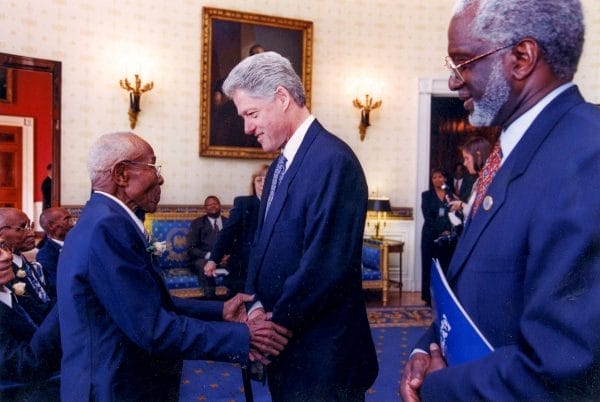 Pres. Bill Clinton and Tuskegee Syphilis Study Survivor
In the ensuing decades, the study took on a life of its own. Generations of PHS doctors came through Tuskegee to examine the men and participate in the study. The Alabama and Macon County health departments turned a blind eye to the study’s violations of state law requiring the reporting and treatment of venereal disease, but the study was never really invisible. Between 1936 and 1973, researchers published 13 reports in medical journals in which the men were sometimes referred to as “volunteers.” As more and more participants died, the statistics provided a clear message: untreated syphilis had shortened their lives and caused many, but not all, of their deaths. Even with such dramatic findings, the study continued.
Pres. Bill Clinton and Tuskegee Syphilis Study Survivor
In the ensuing decades, the study took on a life of its own. Generations of PHS doctors came through Tuskegee to examine the men and participate in the study. The Alabama and Macon County health departments turned a blind eye to the study’s violations of state law requiring the reporting and treatment of venereal disease, but the study was never really invisible. Between 1936 and 1973, researchers published 13 reports in medical journals in which the men were sometimes referred to as “volunteers.” As more and more participants died, the statistics provided a clear message: untreated syphilis had shortened their lives and caused many, but not all, of their deaths. Even with such dramatic findings, the study continued.
During World War II, the PHS, with the help of Macon County health officer Dr. Murray Smith, made sure that none of the study’s subjects were drafted. Had they been, their syphilis would have been detected and treated. When penicillin became widely available in the late 1940s as an effective cure for the disease, the PHS made an effort to ensure that the men did not receive the drug, although penicillin might not have helped those already in the last stages of the disease. Despite these efforts, some of the men did receive penicillin from other health care providers in the 1950s, probably to treat other illnesses.
Questions of Ethics
When PHS researchers published reports on the study or gave lectures at medical meetings, physicians occasionally questioned the ethics of the study. Their concerns were brushed aside by the PHS doctors, who asserted that they were doing critical public health work. Other concerns about the study expressed within the PHS also were brushed aside. Even after Nazi experiments on prisoners in Germany became public knowledge and were denounced, the Tuskegee experiment went unquestioned.
In 1966, Peter Buxtun, who was tracking venereal disease cases for the San Francisco Health Department, heard about the study from a colleague during a coffee break. He was outraged by the idea that citizens just like those he was trying to help were being willfully denied treatment by the PHS. He requested copies of the PHS reports and began a campaign through government channels to end the study. Stonewalled at every turn, Buxtun gave his information to Jean Heller, an Associated Press reporter, who published the story on July 25, 1972, in the Washington Star.
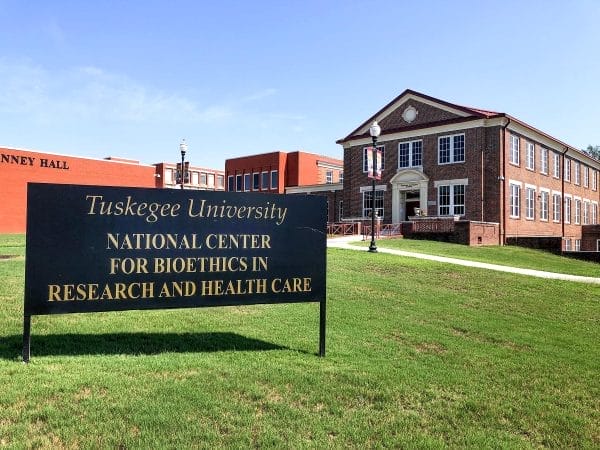 National Center for Bioethics, Tuskegee University
The outcry that followed was international in scope. The story broke at a time when other deadly and unethical medical experiments were becoming more widely known, and it dropped a bombshell in the medical research world. Additionally, withholding treatment from black men in such an important black community fueled the outrage that had come to a head in the recent civil rights struggle. Famed civil-rights attorney Fred D. Gray of Tuskegee and Montgomery sued the PHS and Alabama on behalf of the men and their survivors in a case that settled out of court for $10 million and medical care for the families. A federal commission, U.S. Senate hearings at which Gray and four of the survivors testified, and widespread newspaper coverage led to condemnation of the study. Reverberations from the outcry pushed forward the establishment of institutional review boards for the approval of research studies, with strict guidelines about informing participants about the purposes and potential consequences of taking part in such studies. No one was ever prosecuted for the crimes committed during the study, despite violations of Alabama state law on reporting disease and what could have been construed as intentionally causing deaths.
National Center for Bioethics, Tuskegee University
The outcry that followed was international in scope. The story broke at a time when other deadly and unethical medical experiments were becoming more widely known, and it dropped a bombshell in the medical research world. Additionally, withholding treatment from black men in such an important black community fueled the outrage that had come to a head in the recent civil rights struggle. Famed civil-rights attorney Fred D. Gray of Tuskegee and Montgomery sued the PHS and Alabama on behalf of the men and their survivors in a case that settled out of court for $10 million and medical care for the families. A federal commission, U.S. Senate hearings at which Gray and four of the survivors testified, and widespread newspaper coverage led to condemnation of the study. Reverberations from the outcry pushed forward the establishment of institutional review boards for the approval of research studies, with strict guidelines about informing participants about the purposes and potential consequences of taking part in such studies. No one was ever prosecuted for the crimes committed during the study, despite violations of Alabama state law on reporting disease and what could have been construed as intentionally causing deaths.
The study officially ended in 1973, and the last survivor died in 2004, but the impact continues. The Tuskegee study is often cited as the reason that many African Americans avoid medical care or refuse to participate in clinical trials, although it is clearly part of a long history of mistrust. The study is taught as a major example in bioethics courses on how not to conduct research and was fictionalized in the HBO movie Miss Evers’ Boys. An outcome of the federal apology in 1997 was the creation of the National Center for Bioethics in Research and Healthcare at Tuskegee University. The racism and scientific arrogance that underlay the study’s rationale continues to inform the use of human subjects in trials in the fields of health care and scientific investigation.
Further Reading
- Gray, Fred D. The Tuskegee Syphilis Study. Montgomery, Ala.: Black Belt Press, 1998.
- Jones, James H. Bad Blood: The Tuskegee Syphilis Experiment. New York: Free Press, 1993.
- Reverby, Susan M., ed. Tuskegee’s Truths: Rethinking the Tuskegee Syphilis Study. Chapel Hill: University of North Carolina Press, 2000.
- “The Deadly Deception.” NOVA. Boston: WGBH Educational Foundation, 1993. Distributed by Films of the Humanities and Sciences.
- Miss Evers’ Boys. Directed by Joseph Sargent. New York: HBO Films, 2001.

